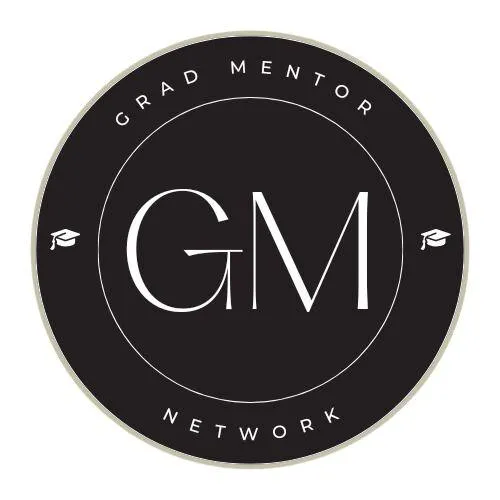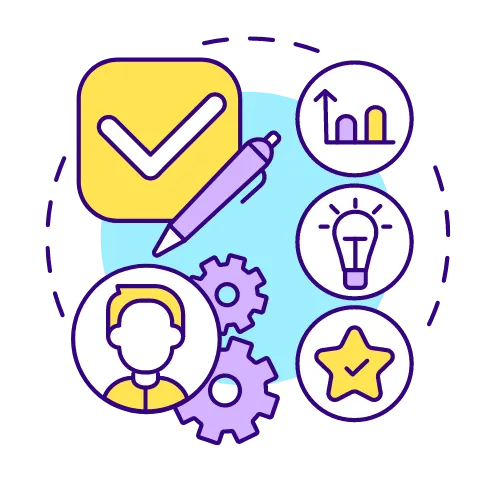

Welcome to the Grad Mentor Network
Unlock Your Academic Potential with Our Exclusive Membership Plans

WHO WE ARE
Unlock Success with Tailored Academic Support
At Grad Mentor Network, led by Dr. Robinson and showcased on renowned platforms such as "Dissertation in 90 Days" and "Club 3E," we offer a comprehensive support system for graduate and doctoral students. Leveraging the expertise of WritersER, which helps master's and PhD candidates achieve approval in six months or less, and our Grad Bootcamps, designed to help students navigate the complexities of academia through bootcamps, our programs are meticulously crafted to support you through every stage of your academic journey. Subscribe today and unlock access to an extensive array of resources, expert guidance, and a supportive community tailored specifically to your academic needs.


Mentoring
Personalized guidance from experts, including Dr. Robinson, to help members navigate their academic journey effectively.

Resources
Access to a comprehensive library of study guides, templates, and specialized training materials tailored for graduate and doctoral studies.

Community
Connection to a private online network where members can interact, share experiences, and support each other through their academic challenges.
Tier 1:
Essential Support - $19/month
Podcasts
Tune in to five weekly podcast episodes packed with strategies for dissertation success, effective time management, research methodologies, and tackling graduate challenges.
Community Access
Join our exclusive online community to connect with peers, share your journey, and find support from fellow students.
Newsletters
Receive five weekly newsletters filled with actionable advice, insightful tips, and motivational content designed specifically for graduate and doctoral students.
Live Q&A Sessions
Engage in our monthly live Q&A sessions with Dr. Robinson and other field experts, designed to answer your burning questions and provide personalized guidance.
Tier 2:
Advanced Support - $49/month
(Includes Tier 1)
GradCoach.io App Access Coming Soon
Get tailored training covering everything from proposal writing to thesis defense, exclusively designed for PhD and Master's students.
Weekly Live Training
Participate in live interactive sessions that delve into essential aspects of the academic journey, offering real-time feedback and personalized advice.
Resource Library
Study guides, templates, and essential research tools sent to your email.
Exclusive Discounts
Enjoy special discounts on Grad Mentor Network-branded merchandise and academic tools.
Digital Calendar
Start each month with a new, beautifully designed digital calendar wallpaper.
Tier 3:
Premium Support - $79/month
(Includes Tiers 1 and 2)
Dissertation Tools
Access downloadable exercises and worksheets tailored for each phase of your dissertation, keeping you organized and on track.
Monthly Digital Product
Receive a new digital product each month, such as e-books, specialized training videos, or unique templates.
Monthly Mastermind Sessions
Join small group mastermind sessions that focus on specific academic challenges, offering tailored solutions and peer support
One-on-One Mentoring
Benefit from two personal mentoring sessions per month, providing you with expert guidance tailored to your individual needs.
Priority Support and Exclusive Content
Enjoy priority email support and behind-the-scenes looks at training sessions and upcoming projects.
Personalized Editing Support (10 Pages per month)
Receive tailored editing assistance for up to 10 pages each month, ensuring your content is polished and professionally refined to meet your specific needs.
Tier 4:
Exclusive Support - $99/month
(Includes Tiers 1, 2, and 3)
Recognition and Thanks
Be acknowledged by name in all new podcast episodes and video descriptions.
Specialized Webinars
Gain access to exclusive webinars discussing advanced topics like grant writing and career planning in academia.
Personalized Feedback
Receive detailed feedback on your dissertation chapters or research papers from Dr. Robinson or a senior mentor.
Networking Opportunities
Get invitations to virtual networking events with alumni and professionals across various academic fields.
Unique Merchandise
Claim exclusive Grad Mentor Network merchandise not available to other tiers.
Personalized Editing Support (15 Pages per month)
Get customized editing support for up to 15 pages monthly, enhancing clarity, style, and accuracy according to your unique requirements.
Tier 5:
Ultimate Support - $109/month
(Includes Tiers 1, 2, 3, and 4)
Social Media Recognition
Receive a monthly shoutout by name on our social media platforms and YouTube community tab.
On-Screen Credits
Enjoy on-screen recognition as a co-sponsor in every episode of our podcasts and training videos.
VIP Access
Get exclusive tickets to VIP events and workshops, designed to elevate your academic and professional connections.
Advanced Mastermind Sessions
Engage in weekly advanced mastermind sessions with high-achieving peers and field experts.
Exclusive Content Feed
Dive into an exclusive content feed filled with behind-the-scenes updates, additional resources, and more.
Free Books
Enjoy a free book every month from the Doctoral Chronicles Series or authored by Dr. Robinson, up to 12 books a year.
Resources

Coaching and Editing Support for your Dissertation

Books, Newsletters and Podcasts

Bootcamps

TAKING A FRESH LOOK
Membership Tiers
Tier 1
1 Month Essential Support
$19
Weekly Podcasts
Motivational Newsletters
Private Community
Monthly Q&A
Tier 2
1 Month Advanced Support
$49
Tier 1
App Access
Live Training
Resource Library
Merchandise Discounts
Tier 3
1 Month Premium Support
$79
Tier 1 & 2
Dissertation Tools
Digital Products
Bi-Weekly Mastermind
One-on-One Mentoring
Tier 4
1 Month Exclusive Support
$99
Tier 1, 2 & 3
Name Recognition
Specialized Webinars
Personalized Feedback
Networking Events
Tier 5
1 Month Ultimate Support
$109
Tier 1, 2, 3 & 4
Social Media Shoutout
On-Screen Credits
VIP Event Access
Advanced Mastermind
Resource Milestones
Expansive Collection of Guides, Templates, and Training Materials

5,000+
Downloads Achieved

1,200+
Resources Created

Recent Blogs

Effective Strategies for Conducting Interviews in Graduate Research
Effective Strategies for Conducting Interviews in Graduate Research
Introduction
Interviews are one of the most valuable data collection methods in qualitative research. Whether you're working on a thesis, dissertation, or independent research project, conducting interviews allows you to gather in-depth insights directly from individuals. However, conducting an effective interview requires careful planning, strong communication skills, and an ability to ask the right questions. In this guide, we’ll explore the best practices for conducting interviews in graduate research, ensuring that you get the most meaningful data for your study.

1. Prepare Thoroughly for Each Interview
Preparation is key to conducting a successful interview. Before you begin, make sure you are well-acquainted with your research topic, the specific questions you plan to ask, and the background of the interviewee. A well-prepared interviewer not only gains more valuable insights but also establishes credibility and rapport with participants.
How to Prepare:
Research the Participant: Understand their background, expertise, and relevance to your study.
Prepare a List of Questions: Have a structured set of questions ready but remain flexible to follow the conversation as it unfolds.
Test Your Recording Equipment: Whether you’re conducting interviews in person or online, ensure that your audio or video recording devices are functioning properly.
Tip: Write down potential follow-up questions to dig deeper into interesting or unexpected responses during the interview.
2. Create a Comfortable Environment
For an interview to be effective, participants need to feel comfortable and at ease. Whether you’re interviewing in person or remotely, it’s essential to create a relaxed atmosphere where participants can share their thoughts openly without feeling rushed or pressured.
Creating Comfort for Participants:
Choose a Quiet and Private Space: If in-person, select a location that minimizes distractions. For online interviews, ensure both you and the participant are in a quiet space with reliable internet.
Build Rapport: Begin with small talk to help the participant feel more at ease before diving into the formal questions.
Assure Confidentiality: Emphasize that their responses will be kept confidential, especially if discussing sensitive topics.
Tip: Take a genuine interest in what the interviewee says. Active listening not only shows respect but encourages more in-depth responses.
3. Ask Open-Ended and Probing Questions
The quality of your interview data largely depends on the types of questions you ask. Open-ended questions encourage participants to provide detailed and thoughtful responses, while probing questions help you explore areas of interest more deeply.
Effective Questioning Techniques:
Use Open-Ended Questions: These invite participants to share more information. For example, instead of asking, "Did you find the project useful?" ask, "How did the project impact your work?"
Probe for More Detail: Follow up on vague or incomplete answers with questions like, "Can you explain that further?" or "What led you to that conclusion?"
Avoid Leading Questions: Ensure that your questions don’t push the participant toward a particular answer. Keep them neutral and unbiased.
Tip: Be prepared to adapt your questions on the fly. If the participant brings up something unexpected, explore that direction to gain more valuable insights.
4. Practice Active Listening
Active listening is essential for conducting meaningful interviews. While it’s important to ask good questions, it’s equally important to truly listen to the responses, rather than thinking about your next question. This not only helps you pick up on subtle cues but also builds trust with the participant.
Techniques for Active Listening:
Make Eye Contact: If conducting the interview in person or via video call, maintain eye contact to show engagement.
Take Notes Without Interrupting: Jot down key points or ideas while still giving the participant your full attention.
Paraphrase Responses: Occasionally summarize what the interviewee has said to ensure you’ve understood their point and to encourage them to elaborate.
Tip: Sometimes, allowing a short silence after a participant’s response can lead them to share additional thoughts they might not have mentioned initially.
5. Record and Transcribe the Interview
Recording your interviews is essential for capturing accurate data, especially when the conversation contains detailed responses that may be difficult to recall afterward. Transcribing the interview allows you to analyze the responses thoroughly during the data analysis phase.
Recording and Transcribing Tips:
Get Permission: Always ask for the participant’s consent to record the interview.
Use Reliable Recording Tools: Choose high-quality recording devices or software to avoid technical difficulties.
Transcribe Carefully: Transcribe the interview verbatim, including pauses and emphasis when relevant, to preserve the full context of the conversation.
Tip: If you’re conducting multiple interviews, consider using transcription software or hiring a professional transcriber to save time.
6. Analyze Your Data Systematically
After conducting and transcribing your interviews, it’s time to analyze the data. For qualitative research, this typically involves identifying themes, patterns, and insights that align with your research question. Effective analysis will help you draw meaningful conclusions from the responses.
Steps for Analyzing Interview Data:
Code the Data: Assign labels or "codes" to key themes, concepts, or ideas that emerge during the interview.
Look for Patterns: Group similar responses together to identify common themes or perspectives.
Compare Across Interviews: If conducting multiple interviews, compare the responses to see how different participants approach the same questions.
Tip: Use qualitative data analysis software like NVivo or ATLAS.ti to help organize and code your data more efficiently.
Conclusion: Conduct Interviews with Confidence
Conducting effective interviews is an essential skill for many graduate research projects, especially those involving qualitative data. By preparing thoroughly, asking thoughtful questions, and practicing active listening, you’ll be able to gather valuable insights that contribute to your research. Remember, the key to a successful interview is making the participant feel comfortable, respected, and engaged throughout the process.
Ready to conduct interviews for your research project? Join the WritersER community for expert tips, resources, and personalized coaching to help you master the art of interviewing. Click here to get started!
Begin Your Journey Today!
Embark on a transformative academic journey with Grad Mentor Network. Choose the membership tier that best suits your needs and become part of a network dedicated to your success. Subscribe now and take the first step towards unlocking your potential in the academic world.
